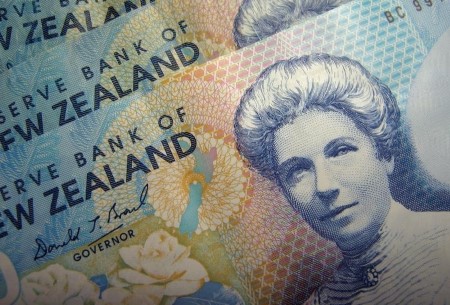WELLINGTON, Jan 25 (Reuters) - WELLINGTON, Jan 25 (Reuters) – New Zealand's interest rates are expected to remain on hold this week but the pressure for rate cuts is building, in particular as the economy teeters on the verge of deflation.
Data last week showing annual inflation at 0.1 percent in the fourth quarter – the lowest since 1999 - has raised the stakes for the Reserve Bank of New Zealand (RBNZ) which is mandated to keep inflation between 1 percent and 3 percent.
In December the RBNZ cut its benchmark official cash rate back to a record low of 2.50 percent but virtually shut the door on further easing, saying it expects to achieve its inflation target without more monetary stimulus.
The latest inflation data, which undershot its own forecasts by a wide margin, may force it to backtrack. Economists do not expect a cut out of the RBNZ's meeting on Thursday according to a Reuters poll, but most expect the tone of the central bank’s statement to point to more easing down the track.
Royal Bank of Canada Economist Michael Turner said a cut this week is not out of the question but it's more likely the central bank "waits for the dust to settle following the New Year volatility and looks to ease policy when unveiling weaker output and inflation forecasts at its March monetary policy statement."
The RBNZ joins central banks around the world that are struggling with weak inflation and a shaky global backdrop. Bank of Japan Governor Haruhiko Kuroda said Friday there is further room for the BoJ to expand its quantitative easing program if inflation continues to wane. His comments came on the heels of European Central Bank Chief Mario Draghi saying his bank would need to review its policy in March, which was read by markets as a promise of more easing.
"Developments, particularly the weak Q4 CPI outcome should be prompting a rethink within the RBNZ," said ASB Bank Chief Economist Nick Tuffley. ASB is tipping two more rate cuts this year to 2.0 percent.
"The RBNZ will cut the official cash rate further this year, from 2.5 percent to 2.0 percent," said Westpac Bank Senior Economist Michael Gordon, noting this week's review provided the central bank with an "opportunity to shift towards an explicit easing bias."
However, solid consumer and business confidence as well as record high tourist and migrant numbers coupled with a hot housing market mean that not all economists are convinced.
News that house prices are pushing higher nationwide will have raised red flags at the central bank, which has voiced consistent concern about rising house price inflation in the largest city of Auckland.
The data "suggests the wider economy does not need additional stimulus, while housing remains a constraint on policy rates," said UBS Senior Economist Robin Clements.
Annette Beacher, chief Asia-Pacific Macro Strategist for TD Securities, said tepid inflation will push the central bank to return to a clear easing bias where it likely says "some further easing may be appropriate. This will depend on emerging data." However, she expects the data to remain solid and sees interest rates on hold at 2.5 percent until 2017.
- Forums
- NZX - General
- News: PREVIEW-Tepid inflation may push New Zealand central bank to easing bias






